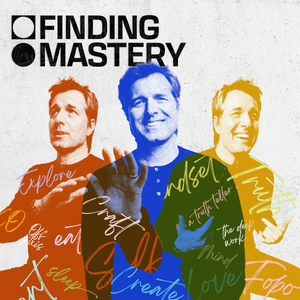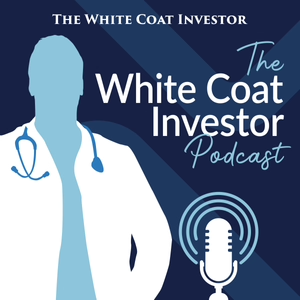
Crisis of Depression and Suicide with Dr. Elisabeth Poorman
07/03/18 • 38 min
Facts: One in four medical students are depressed and 11% have contemplated suicide; at the beginning of the internship 4% have reported feeling depressed and by the end, 40% meet the criteria for depression. We are facing a real crisis in the medical arena; interns and physicians are suffering in silence, and the suicide rates have been escalating terribly in the last two decades. Dr. Elisabeth Poorman has gone through the suffering herself and is now dedicating her efforts to bringing awareness about this critical situation as well as the proper attention that medical students, interns, and physicians are needing. Listen to this thoughtful and difficult conversation and be encouraged and inspired to make the transition from intellectual empathy to real compassion
Key Takeaways:
[1:29] How did Dr. Poorman get interested in this field?
[3:25] Is it really depression?
[4:30] Accepting vulnerability.
[5:05] Different definitions about burnout.
[6:30] Crisis of depression and suicide among physicians.
[7:21] Stigma in seeking treatment.
[9:35] Seeking an alternative to an inadequate attention to depressed interns.
[12:01] Suicidal crisis statistics.
[14:55] How can practitioners seek help when having suicidal ideation respecting their privacy and dignity?
[15:45] When understaffed and someone is feeling depressed the question is “who is going to cover his shifts?”
[16:58] Suicide has increased more than 25% in the last 17 years across the country.
[18:10] Patients should care if their physicians are not feeling well.
[20:08] Challenges are different for women.
[20:25] Sexism when a woman physician treats patients and also among colleagues.
[23:43] From intellectual empathy to compassion.
[27:18] Safety practice is not about pleasing one another.
[28:21] Suffering should not define a doctor.
[28:49] How does Dr. Elisabeth Poorman take care of her own mental health?
[31:30] Relearning yourself after residency.
[32:47] Advice to medical students.
[34:12] Doctors should be able to share more stories with one another.
Mentioned in this episode:
Relational Rounds at Primary Care Progress
Primary Care Progress on Twitter
Toll-free National Suicide Prevention Lifeline (NSPL) at 1–800–273–TALK (8255)
Facts: One in four medical students are depressed and 11% have contemplated suicide; at the beginning of the internship 4% have reported feeling depressed and by the end, 40% meet the criteria for depression. We are facing a real crisis in the medical arena; interns and physicians are suffering in silence, and the suicide rates have been escalating terribly in the last two decades. Dr. Elisabeth Poorman has gone through the suffering herself and is now dedicating her efforts to bringing awareness about this critical situation as well as the proper attention that medical students, interns, and physicians are needing. Listen to this thoughtful and difficult conversation and be encouraged and inspired to make the transition from intellectual empathy to real compassion
Key Takeaways:
[1:29] How did Dr. Poorman get interested in this field?
[3:25] Is it really depression?
[4:30] Accepting vulnerability.
[5:05] Different definitions about burnout.
[6:30] Crisis of depression and suicide among physicians.
[7:21] Stigma in seeking treatment.
[9:35] Seeking an alternative to an inadequate attention to depressed interns.
[12:01] Suicidal crisis statistics.
[14:55] How can practitioners seek help when having suicidal ideation respecting their privacy and dignity?
[15:45] When understaffed and someone is feeling depressed the question is “who is going to cover his shifts?”
[16:58] Suicide has increased more than 25% in the last 17 years across the country.
[18:10] Patients should care if their physicians are not feeling well.
[20:08] Challenges are different for women.
[20:25] Sexism when a woman physician treats patients and also among colleagues.
[23:43] From intellectual empathy to compassion.
[27:18] Safety practice is not about pleasing one another.
[28:21] Suffering should not define a doctor.
[28:49] How does Dr. Elisabeth Poorman take care of her own mental health?
[31:30] Relearning yourself after residency.
[32:47] Advice to medical students.
[34:12] Doctors should be able to share more stories with one another.
Mentioned in this episode:
Relational Rounds at Primary Care Progress
Primary Care Progress on Twitter
Toll-free National Suicide Prevention Lifeline (NSPL) at 1–800–273–TALK (8255)
Previous Episode

Teaming and Psychological Safety with Dr. Amy C. Edmondson
Dr. Amy C. Edmondson is the Novartis Professor of Leadership and Management at the Harvard Business School; she received her Ph.D. in organizational behavior, AM in psychology, and AB in engineering and design from Harvard University too. She is also the author of several books about teaming and psychological safety. Dr. Edmondson joins Elizabeth Metraux to talk about key topics like how to create a work environment where people can feel confident and safe to share their worries and expose their weaknesses and errors. Dr. Edmondson explains how hierarchy and teaming are not exclusionary, and how learning to ask the right questions can be more important than clever answers. Listen to this podcast and be inspired by the amazing work of Dr. Edmondson in human interactions to make the world a better place, one team at a time.
Key takeaways:
[:35] Dr. Edmonson career briefing
[1:13] How did Dr. Edmondson started working in the field of teaming?
[5:15] Psychological safety and its relationship with performance.
[5:37] How do you teach a human skill like psychological safety?
[7:09] Essential importance of teamwork specially in healthcare.
[9:18] Hierarchy and Teaming, when one or the other?
[12:04] Basic advice for a new leader in creating trust and safety in teamwork: Ask Questions.
[13:45] Humility is strength.
[16:18] How challenges like demographic diversity should be acknowledged?
[19:05] Making room for belonging.
[23:05] Psychological safety in hierarchies.
[26:30] Opportunities and vulnerabilities across the career stage in leadership.
[28:20] Being a leader can be a lonely job but also a meaningful one.
[29:30] There is an increasing burnout issue in health care, can a change be made or is too late for that?
[34:35] Not just sick care but health care.
[35:53] What Dr. Edmondson has learnt about herself during her time in teamwork?
Mentioned in this episode:
Relational Rounds at Primary Care Progress
Primary Care Progress on Twitter
Learn more about Dr. Amy Edmondson.
The Fearless Organization: Creating Psychological Safety in the Workplace for Learning, Innovation, and Growth, Dr. Amy C. Edmondson.
Next Episode

Renaissance of Primary Care with Dr. Alan Kurose
Al Kurose, M.D. is President and CEO of Coastal Medical, a primary-care-driven Accountable Care Organization (ACO). Coastal Medical provides care to 120,000 patients in more than 20 medical offices across Rhode Island. Dr. Al’s current experience in the administrative area, as well as many years with direct attention to patients, have given him an amazing perspective on how health service can be improved. Key concepts like team-based care, burnout, and patient-centered care are approached in this succulent talk. Dr. Alan also shares insightful tips for new medical students and practitioners to have under consideration in the first career choices. Healthcare can be transformed; listen to this podcast and find out how to start
Key Takeaways:
[1:05] What brought Dr. Alan Kurose into medicine?
[2:44] What is the best part of practicing medicine?
[5:04] The value of seeing patients at their home.
[7:27] How burnout will affect new practitioners.
[8:18] The solution to burnout will come from the started collaborative process.
[8:50] Renaissance of primary care contrasted with burnout and suicidal rates going up.
[9:58] What is working and what is not working?
[11:15] Stay realistic in what you can and can’t offer patients.
[13:20] Burnout is an individual problem but there are systemic factors that can help..
[14:15] Team-based care.
[16:40] Coastal Medical Care success formula.
[20:08] Patients in medical homes.
[22:38] Training and support Dr. Alan got at the beginning of his practice.
[27:21] Dr. Alan’s big crazy idea to fix healthcare: Patient-centered service.
[30:20] Advice to new medical students: Don’t be distracted.
Mentioned in this episode:
Relational Rounds at Primary Care Progress
If you like this episode you’ll love
Episode Comments
Generate a badge
Get a badge for your website that links back to this episode
<a href="https://goodpods.com/podcasts/relational-rounds-474428/crisis-of-depression-and-suicide-with-dr-elisabeth-poorman-63773376"> <img src="https://storage.googleapis.com/goodpods-images-bucket/badges/generic-badge-1.svg" alt="listen to crisis of depression and suicide with dr. elisabeth poorman on goodpods" style="width: 225px" /> </a>
Copy




